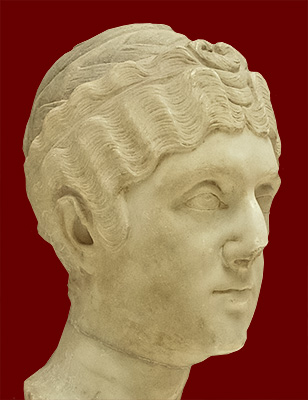
Marble portrait perhaps of Domitia Lucilla
Ostia, 2nd century CE

Domitia Lucilla Minor, remembered principally as the mother of an emperor, was born in 100 CE in Italica, Spain, and died in Rome, where she lived most of her life, in c. 155 CE. A woman of noble birth, she inherited her family name (Domitia) and her great wealth, including a prosperous tile and brick factory near Rome, from her mother; their names appear on stamped tiles recovered from buildings in Rome and the provinces (CIL 15.1008-1024; 1025-1092). Domitia Lucilla Maior was herself an heiress twice over, first of her grandfather and then of her uncle; Pliny, in a letter to Rufinus that does not name her, describes the complexity of her adoptions (Ep 8.18). The father of Domitia Lucilla Minor was the Roman patrician Publius Domitius Calvisius Tullus Ruso (c.75-109 CE; consul in 109 CE), in whose family home Herodes Atticus (101-177 CE) spent part of his childhood (see ad M. Caesarem 3.2). As a daughter of the upper classes in the 2nd century CE, she would have been educated from youth in Greek and Roman culture in preparation for joining another elite family through marriage. She married Marcus Annius Verus (c.60-124 CE), a praetor and member of a wealthy senatorial family with imperial connections: one of his sisters was Annia Galeria Faustina Maior, the wife of Antoninus Pius (Emperor 138-161 CE). Domitia Lucilla and Verus had two children: Annia Cornificia Faustina (c.122-between 152-158) and Marcus Aurelius Antoninus (121-180 CE), who was only 3 when his father died. Domitia also raised Didius Julianus (Emperor 193 CE) in her household and influenced his election to the vigintiviri, the beginning of his public career (Historia Augusta 1.3). Early in Book I of his Meditations, Aurelius acknowledges his mother's importance to his moral education: "From my mother, piety and beneficence, and abstinence, not only from evil deeds, but even from evil thoughts; and further, simplicity in my way of living, far removed from the habits of the rich." After he was adopted as heir in 139 CE by Antoninus Pius (see adoptive emperors), Domitia Lucilla continued to live with her son in the imperial palace, where he was assigned a tutor in rhetoric, the grammarian and orator Marcus Cornelius Fronto (c. 100-170 CE), to educate him for his future role (Emperor 161-180 CE). Whether she had any role in the selection of his tutor, it is clear from the surviving letters between student and tutor that Domitia Lucilla closely followed her son's education. She became a friend of Fronto's wife Cratia, about whom little else is known. The two women are mentioned regularly, but not in any depth, in the correspondence between the youthful Marcus Aurelius and Fronto (to whom the mature Aurelius bears a startling resemblance). The letters testify to a fond relationship between Domitia Lucilla and her son, as does the coin on which they are featured (Nicaea, Bithynia, mint c. 150 CE). For further discussion of the friendship between Domitia Lucilla and Cratia, consult the Bibliography for articles by Richlin (2011), who reads them as extensions of an amorous relationship between Aurelius and Fronto, and Taoka (2013), who argues that they act as boundaries between the hetero-normative world of the family and the homoerotic world of elite men.
In the final paragraph of Fronto's letter to the young Marcus Aurelius, written during Fronto’s consulate in the summer of 143 CE (see II.2), Fronto concludes by noting that he has composed a letter in Greek for Aurelius’ mother, Domitia Lucilla (see ad Marcum Caesarem II.3). While Fronto seeks to earn the gratitude of his imperial pupil by writing to a significant figure in his life, his action indicates that Domitia Lucilla had achieved a level of mastery in Greek unusual in women even of her class and that she was a philhellenist as well.
Epistulam matri tuae scripsi quae mea inpudentia est Graece, eamque epistulae ad te scriptae inplicui.
Tu prior lege et, si quis inerit barbarimus, tu, qui a Graecis litteris recentior es, corrige atque ita matri redde.
Nolo enim me mater tua ut Opicum contemnat.
Vale, domine, et matri savium da, cum epistulam dabis, quo libentius legat.
This is a selection from the middle of a letter written by the young Aurelius to his tutor Fronto, thought to have been written between 141-143 CE (see IV.6). In it, the adopted heir describes what appears to be a customary domestic scene between his mother and himself in his room at the palace. His words also confirm the affectionate friendship Domitia Lucilla had with Cratia, Fronto's wife.
Ab hora sexta domum redimus. Paululum studui atque id ineptum.
Deinde cum matercula mea supra torum sedente multum garrivi.
Meus sermo hic erat: “Quid existimas modo meum Frontonem facere?”
Tum illa: “Quid autem tu meam Cratiam?”
Tum ego: “Quid autem passerculam nostram Cratiam minusculam?”
Dum ea fabulamur atque altercamur, uter alterutrum vestrum magis amaret, discus crepuit, id est, pater meus in balneum transisse nuntiatus est.
Click on the underlined words for translation aids and commentary, which will appear in a small window.